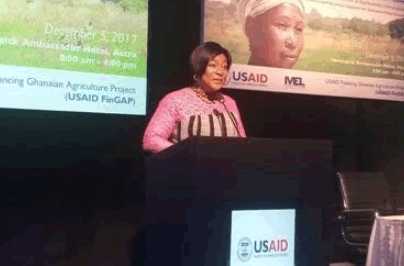Women in agriculture can help achieve Ghana beyond Aid – USAID

Ms Sharon L. Cromer, USAID Ghana Mission Director, on Tuesday said Ghana can attain its vision of self-reliance faster and more sustainably if it empowers its people, especially women and particularly those in agriculture.
She noted that whilst President Nana Addo Dankwa Akufo Addo’s emphasis on Ghana realizing its full potential by reducing its reliance on foreign assistance; the USAID Administrator’s position is that the purpose of foreign assistance was to end the need for its existence in the first place, through effective, accountable, and responsible country systems.
Ms Cromer made the statements during the opening of the USAID Financing Ghanaian Agriculture Project (FinGAP) Women in Agribusiness Development Summit held in Accra.
She said women, who made up over 50 per cent of the country’s population, were an underutilized resource, who faced various challenges, adding that progress could not be made when over half of the country faced a range of economic and social challenges, such as lack of access to lands, markets, agricultural technologies and inputs.
“At USAID, we believe women in agriculture, if empowered, can help Ghana achieve the Beyond Aid vision faster and more sustainably,” she noted, buttressing it with a quote by former UN Secretary General, Mr Kofi Annan: “there is no tool more effective than the empowerment of women”.
She stated that fostering of a broad-based inclusive economic growth meant unlocking everyone’s potential including women and youth.
Ms Cromer also stressed the need to access finance for women in agribusiness, adding that the USAID was working with government and development partners, as well as private sector partners, to improve access for women-led business to enable them expand their operations.
Mr Fatih Ermis, Head of Agricultural Service at Nestle Central and West Africa Region, delivering the keynote address, said women, according to research by the Food and Agriculture organization, made up nearly 43 per cent of the agriculture labour force in developing countries, however, they were faced with some gender-specific challenges that Nestle was making efforts to address.
He said Nestle had introduced programmes like the Grains Quality Improvement Programme, Nestle Cereal Plan, Cocoa Plan and Nescafe Plan to help farmers, including women to improve on agronomic practices, and improve and increase yields.
In Ghana, the Nestle Grains Quality Improvement project had been successful in helping a woman farmer; Samata Alidu, to transform her maize production from four to five bags per acre to 10 to 12 bags, using skills acquired from Nestle agronomists under the project.
“Women empowerment is one of the critical issues for the business and the stakeholders that have been identified and included in a formal materiality process…empowering women, particularly women farmers, to participate fully in society and the economy across the value chain is how Nestle is committed to address this issue,” he stated.
Mr Ermis also urged the stakeholders to support women to impact their community by training in nutrition and food safety.
Ms Otiko Afisa Djaba, Minister for Gender, Children and Social Protection, said government recognised the important role of the agricultural sector in Ghana’s economy and thus had increased the budgetary allocation to the Agric sector for 2018 to GH¢599 million, from GH¢572 million.
She called on women to take advantage of the initiatives that government had put in place such as the Planting for Food and Jobs, Youth in Agriculture Programme, One District One Factory and the One Village One Dam programmes.
She noted that the Gender Ministry was already working with over 24,000 women who served as caterers, and several Ghanaian agribusinesses and farmers who supply the School Feeding Programme with local rice, maize, beans, groundnuts, tomatoes and onions, among others, and will increase the number by 30 percent next year.
Ms Djaba called on financial sector players to increase their support for women in agribusiness, and commended the USAID FinGAP for complementing government’s efforts to empower women to become business leaders and industry players.
Source: GNA
